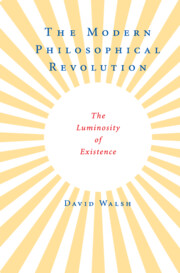Book contents
- Frontmatter
- Contents
- Preface
- Introduction
- 1 Kant's “Copernican Revolution” as Existential
- 2 Hegel's Inauguration of the Language of Existence
- 3 Schelling on the Beyond of Existence
- 4 Nietzsche: Philosophy as Existence
- 5 Heidegger's Achievement Despite the Betrayal of Philosophical Existence
- 6 Existence Without Refuge as the Response of Levinas
- 7 Derrida's Dissemination of Existence as Différance
- 8 Kierkegaard's Prioritization of Existence over Philosophy
- Epilogue: Modernity as Responsibility
- Works Cited
- Select Bibliography of Secondary Sources
- Index
5 - Heidegger's Achievement Despite the Betrayal of Philosophical Existence
Published online by Cambridge University Press: 05 June 2012
- Frontmatter
- Contents
- Preface
- Introduction
- 1 Kant's “Copernican Revolution” as Existential
- 2 Hegel's Inauguration of the Language of Existence
- 3 Schelling on the Beyond of Existence
- 4 Nietzsche: Philosophy as Existence
- 5 Heidegger's Achievement Despite the Betrayal of Philosophical Existence
- 6 Existence Without Refuge as the Response of Levinas
- 7 Derrida's Dissemination of Existence as Différance
- 8 Kierkegaard's Prioritization of Existence over Philosophy
- Epilogue: Modernity as Responsibility
- Works Cited
- Select Bibliography of Secondary Sources
- Index
Summary
If we regard Nietzsche as the furthest reach of the philosophical revolution wrought by German idealism, Heidegger represents the moment of its greatest danger. The undiminished fascination with the “problem” of Heidegger does not simply derive from a curiosity about his personal failures, no matter how absorbing such a preoccupation may be. It is a controversy that has irrupted at regular intervals since 1933. New information about his complicated relationship with Nazism has, far from resolving the debates, only whetted appetites for more. No doubt there are morbid dimensions to the interest itself, but there is more in it than ordinary prurience. Even when we may not have admitted it to ourselves, we sense that the fate of philosophy itself is bound up with the verdict on its most impressive practitioner in the twentieth century. For all of Heidegger's lamentable character flaws, even his detractors cannot deny the elemental force of his philosophical genius. “The gale that blows through Heidegger's thinking – like that which still, after thousands of years, blows to us from Plato's work – is not of our century.” So wrote Hannah Arendt, who intuited in him something of the “primordial” that was at once fascinating and appalling. This is why the debate over Heidegger cannot easily be put to rest, for we sense that it implicates far more than the failure of a particular man. Does it not cast a pall over the entire project of the modern existential revolution in philosophy, if not on the entire history of philosophy itself?
- Type
- Chapter
- Information
- The Modern Philosophical RevolutionThe Luminosity of Existence, pp. 232 - 290Publisher: Cambridge University PressPrint publication year: 2008



